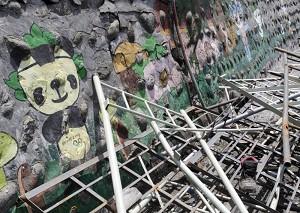Over 1,000 shoe factories have closed down in the Pearl River Delta, Guangdong Province, an event which has caused over 10,000 foreign investors from Taiwan and Hong Kong to withdraw their investments from local businesses and leave the area.
This has resulted in a large number of workers who had migrated to the area from other regions, being forced to leave the area due to unemployment. According to one analysis, numerous foreign investors will be leaving the Pearl River Delta for other provinces or for Southeast Asian countries.
With the large exodus of traditional labor-intensive industries from the Pearl River Delta, the former prosperity of the “World Factory”—China has been widely regarded as the world’s factory—is shaping to fade into history, along with the masses of migrant workers who travel to the region for work annually.
Recently, the Oriental Morning Post reported a story about Xiao Hanjun and his seven colleagues, a group of migrant workers from Hubei Province who were sitting with a large pile of luggage at the Foshan Ancestral Temple Bus Station. Before waiting for the bus taking them away from the southern city, Xiao lamented to his friends that in March they would have to leave their hometown to find work again, but this time the destination would be a factory in Suzhou City, Jiangsu Province.
Mr. A Ming, a long time factory worker from Guangdong’s Dongguan City said,
“Laborers were contracted to be temp workers or contract laborers. With the introduction of China’s New Labor Law—Law of the People’s Republic of China on Employment Contracts, companies want to sign contracts with their workers, but the workers are unwilling to do so, because those who are not under contract can earn twice the wage. Because of this, companies want to make the workers who refuse to sign a contract, quit. The disagreement between employers and employees has lead to a conflict situation.
“Some workers hope to obtain a large severance package, without signing a contract, calculated based upon their years of service, while on the other hand, many companies are unwilling to offer severance packages for such workers. As a result, unsatisfied workers have been filing lawsuits against their employers. At the same time, the companies have been making great efforts to make such workers quit.”
Over the past month, nearly 1,000 shoe factories in the Pearl River Delta region have closed down, pushing over 10,000 Hong Kong investors to the verge of bankruptcy. As a result, several small- and medium-sized companies are planning to remove their factories from the area or even relocate to other countries.
Many entrepreneurs said that they felt threatened by the continuous appreciation of the Chinese currency, rising raw material costs, increased labor cost, difficulties in hiring workers, and limitations on export trade. These factors are like a sword hanging over their heads. To make matters worse, the recent promulgation of the “Law of the People’s Republic of China on Employment Contracts” and the “Unified Income Tax System for Both Domestic and Foreign Enterprises (Two Taxes Merge into One Tax)” policy have served as the last straw, breaking the backs of some companies; as a result, many have decided to leave the area.
It is estimated that there are around 5,000 to 6,000 shoe factories in the Pearl River Delta, mostly scattered throughout major cities such as Dongguan, Huizhou, Guangzhou, Heshan and Zhongshan. Over the past year, 1,000 shoes factories in Guangzhou have closed up shop, while in Huidong, where over 3,000 shoe factories are located in close proximity, 400 to 500 small- and medium-sized companies specializing in shoe manufacturing and material supplies have been forced to close over the past two or three months. A shoe businessman in Dongguan noted that many foreign investors in the area are making preparations to relocate their factories in Vietnam.
Based on statistics by the Asian Footwear Association, about 50 percent of the closed shoe factories will most likely be moved to the provinces of Jiangxi, Hunan and Guangxi, 25 percent to Southeast Asian countries such as Vietnam, Thailand, Indonesia, Malaysia and India, while the remaining 25 percent are still undecided.
According to RFA, the problem is not only with shoe manufacturers. The Olympus Corporation, a renowned Japanese optical instrument manufacturer, has also relocated its factory from Dongguan to Vietnam.
An investigation by the Federation of Hong Kong Industries reveals that 37.3 percent of the 80,000 Hong Kong enterprises in the Pearl River Delta are planning to remove either all or part of their operations from the Pearl River Delta, while about 63 percent have plans to leave Guangdong entirely.
Regarding the collapse of the “World Factory,” Hu Xingdou, a professor at Beijing Institute of Technology commented,
“Currently China has entered a new phase. On the one hand, there is inflation. On the other hand, businesses are facing bankruptcy. China is forced to further adjust its methods to promote economic growth. Presently, rising resource taxes and the promulgation of the Law on Employment Contracts are squeezing extra money out of businesses.
“I predict that a great number of small and medium sized businesses will go under in 2008, thereby causing high unemployment. As a result, the economic situation in 2008 will be tough.”


